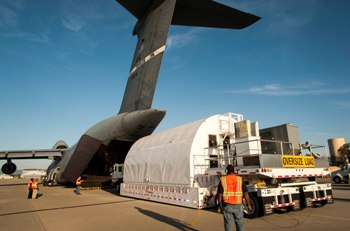The U.S. Navy and Lockheed Martin have delivered the second Mobile User Objective System (MUOS) spacecraft to Cape Canaveral Air Force Station, Fla., where it will be prepared for a July liftoff aboard a United Launch Alliance Atlas V rocket.

MUOS vastly improves current secure mobile satellite communications. It links mobile users for the first time to a powerful voice and data system that delivers high speeds and streaming data, similar to consumer smartphone capabilities. The complete constellation of four spacecraft plus on-orbit spare will provide global coverage with prioritized voice, video and data services.
“Delivery of the second MUOS satellite begins the process of launch site testing and delivery to orbit,” said Iris Bombelyn, vice president of Narrowband Communications at Lockheed Martin. “MUOS-2 will add on-orbit military satellite communication that is heavily in demand. Our first space vehicle has performed exceptionally on orbit, providing legacy payload voice calls at full capacity. In fact, we recently demonstrated mobile data and voice transmissions using our advanced payload.”
Today, MUOS-2 was safely transported from Lockheed Martin’s Sunnyvale, Calif., facility to nearby Moffett Federal Airfield. The 60th Air Mobility Wing of Travis Air Force Base, Calif., then loaded the satellite aboard a C-5 aircraft and successfully shipped the spacecraft to Cape Canaveral Air Force Station.
Atlas V MUOS-1 Launch Highlights
Prior to launch, engineers will complete post shipment testing, fuel the satellite’s propulsion system and encapsulate the spacecraft inside the launch vehicle’s payload fairing. The fairing will then be mated on top of the Atlas V launch vehicle for final integrated testing and closeout preparations for launch.
MUOS-1 has been providing crystal-clear voice communications since it started operating in 2012. More recently, its advanced Wideband Code Division Multiple Access payload has performed flawlessly since terminals began using its waveform, which was developed by General Dynamics and delivered by Lockheed Martin earlier this year. There are more than 20,000 existing terminals compatible with and can access the MUOS legacy payload. After MUOS-2 is operational and the ground stations and terminals have been certified, the full suite of MUOS features will be available to users in the field as new terminals are deployed.
Headquartered in Bethesda, Md., Lockheed Martin is a global security and aerospace company that employs about 118,000 people worldwide and is principally engaged in the research, design, development, manufacture, integration and sustainment of advanced technology systems, products and services. The Corporation’s net sales for 2012 were $47.2 billion.